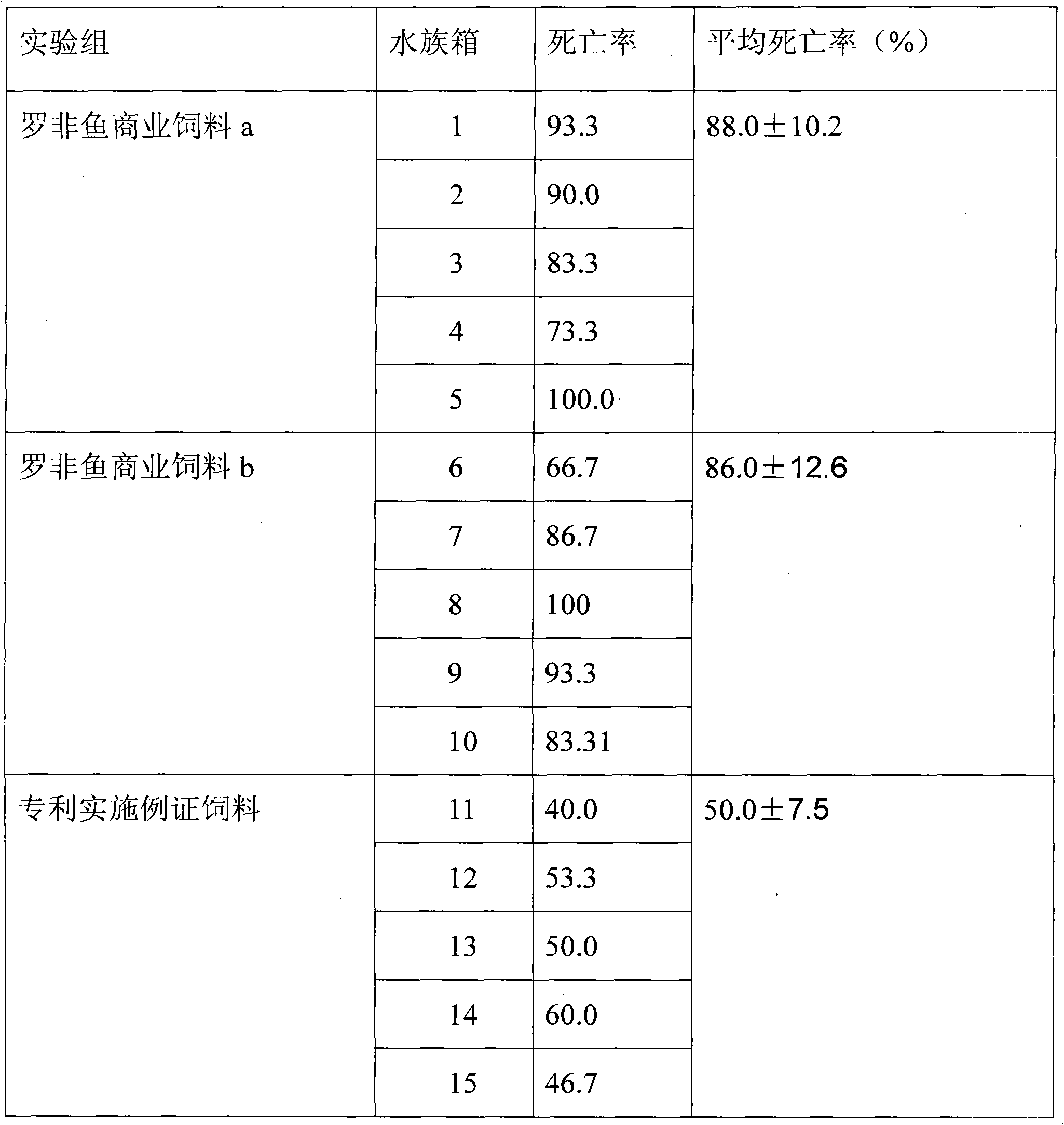Artificial compound feed with function of preventing tilapia mossambica streptococcicosis
A technology of artificial compound feed and streptococcal disease, applied in the field of tilapia artificial compound feed, can solve problems such as hazards, achieve the effects of improving antibacterial ability, preventing tilapia streptococcal disease, and nitrogen-energy ratio balance
- Summary
- Abstract
- Description
- Claims
- Application Information
AI Technical Summary
Problems solved by technology
Method used
Image
Examples
Embodiment 1
[0013] In terms of mass percentage, the following pulverized feed materials were taken: 5% fish meal, 22% soybean meal, 20% rapeseed meal, 10% cotton meal, 10% DDGS (dried distiller's grains and raffinate), 5% rice bran, Flour 15%, corn 6%, soybean oil 1.2%, phospholipid oil 0.5%, calcium hydrogen phosphate 1%, bentonite 1.79%, multivitamin premix 0.7%, choline chloride 0.2%, antioxidant 0.01%, anti-mold Agent 0.1%, compound Chinese medicine additive 1.5%. The composite traditional Chinese medicine additive is 15 parts by weight of Codonopsis radix, 10 parts of Radix Radix, 10 parts of Andrographis paniculata, 10 parts of honeysuckle, 10 parts of bean root, 10 parts of Coptis chinensis, 10 parts of Cortex Phellodendri, 15 parts of rhubarb, and 15 parts of Astragalus membranaceus. It is pulverized by an ultrafine pulverizer, and the pulverization fineness reaches 100 mesh. After the raw materials are fully mixed, they are extruded and cut by feed machinery to make tilapia feed...
Embodiment 2
[0021] In terms of mass percentage, the following pulverized feed materials were taken: 2% fish meal, 20% soybean meal, 25% rapeseed meal, 10% cotton meal, 10% DDGS (dried distiller's grains and raffinate), 5% rice bran, Flour 15%, corn 5%, soybean oil 1.5%, phospholipid oil 0.5%, calcium hydrogen phosphate 1%, bentonite 2.99%, multivitamin premix 0.7%, choline chloride 0.2%, antioxidant 0.01%, anti-mold Agent 0.1%, compound Chinese medicine additive 1%. The composite traditional Chinese medicine additive is 15 parts by weight of Codonopsis radix, 10 parts of Radix Radix, 10 parts of Andrographis paniculata, 10 parts of honeysuckle, 10 parts of Bean root, 10 parts of Coptis chinensis, 10 parts of Cortex Phellodendri, 10 parts of rhubarb and 10 parts of Radix Astragali. It is pulverized by an ultrafine pulverizer, and the pulverization fineness reaches 100 mesh. After the raw materials are fully mixed, they are extruded and cut by feed machinery to make tilapia feed.
[0022]...
Embodiment 3
[0028] In terms of mass percentage, the following pulverized feed materials were taken: 3% fish meal, 23% soybean meal, 20% rapeseed meal, 10% cotton meal, 10% DDGS (dried distiller's grains and raffinate), 5% rice bran, Flour 15%, corn 6%, soybean oil 1.4%, phospholipid oil 0.5%, calcium hydrogen phosphate 1%, bentonite 2.89%, multivitamin premix 0.7%, choline chloride 0.2%, antioxidant 0.01%, anti-mold Agent 0.1%, compound traditional Chinese medicine additive 1.2%. The compound traditional Chinese medicine additive is 20 parts of Codonopsis pilosula, 10 parts of Radix Radix, 10 parts of Andrographis paniculata, 10 parts of honeysuckle, 10 parts of Bean root, 10 parts of Coptis chinensis, 10 parts of Cortex Phellodendri, 10 parts of rhubarb and 10 parts of Astragalus in parts by weight. It is crushed by a pulverizer, and the crushing fineness reaches 100 mesh. After the raw materials are fully mixed, they are extruded and cut by feed machinery to make tilapia feed.
[0029...
PUM
 Login to View More
Login to View More Abstract
Description
Claims
Application Information
 Login to View More
Login to View More - R&D
- Intellectual Property
- Life Sciences
- Materials
- Tech Scout
- Unparalleled Data Quality
- Higher Quality Content
- 60% Fewer Hallucinations
Browse by: Latest US Patents, China's latest patents, Technical Efficacy Thesaurus, Application Domain, Technology Topic, Popular Technical Reports.
© 2025 PatSnap. All rights reserved.Legal|Privacy policy|Modern Slavery Act Transparency Statement|Sitemap|About US| Contact US: help@patsnap.com

